WHITE CITY : EARLY PICS
Trusted Zimbabwean News Worldwide
Foreign election observer missions should be open-minded and must not come with predetermined conclusions to discredit Wednesday’s polls, President Mnangagwa has said. He said this yesterday while addressing tens of thousands of ZANU PF supporters at t…

Foreign election observer missions should be open-minded and must not come with predetermined conclusions to discredit Wednesday’s polls, President Mnangagwa has said. He said this yesterday while addressing tens of thousands of ZANU PF supporters at the ruling party’s final provincial star rally at the Tongogara Business Centre, Shurugwi, in his home province of Midlands. […]
The post LATEST: President Mnangagwa sends a powerful message to election observers first appeared on My Zimbabwe News.Ahead of national elections next week, some people in Zimbabwe’s rural areas say they are facing intimidation from supporters of the long-ruling ZANU-PF party and a biased state-run media that restricts their options. Source: In rural Zimbabwe, a group of grandmothers counters alleged election intimidation, bias on WhatsApp | AP News DOMBOSHAVA, Zimbabwe (AP) — […]
Ahead of national elections next week, some people in Zimbabwe’s rural areas say they are facing intimidation from supporters of the long-ruling ZANU-PF party and a biased state-run media that restricts their options.
Even though Mnangagwa replaced long-ruling autocrat Robert Mugabe in that popular coup, he’s been accused of weaponizing the police and the courts to stifle opposition in the same way Mugabe did. Chamisa and international rights groups claim opposition party figures and supporters are often targeted with harassment, violence and intimidation.
Some rural folks like Mutandwa have found a way to combat the threats and the media bias they also see, but which often go unnoticed deep in the rural areas where the majority of the country’s 15 million people live, and where the opposition’s reach is limited.
“Everyone around here knows we are opposition activists, so some people are too afraid to openly associate with us,” said Mutandwa. “But it’s not a problem anymore. We talk to them through WhatsApp and they can participate in the campaign from the safety of their homes.”
The way Mutandwa and her group of grannies are using cellphones and the internet to cut through the propaganda ahead of elections represents a shift from past rural election campaigns, said Rejoice Ngwenya, a strategic communications specialist in Zimbabwe. While cellphone and internet access was widespread in the cities, opposition parties previously could only use rallies, community meetings, or sometimes even funerals, to reach rural voters and share their message.
Mutandwa now gets Citizens Coalition for Change information straight to her smartphone. And she spreads the word, too, among the 10 or so WhatsApp groups the four grandmothers in Domboshava administer. She needed a couple of lessons from one of her grandsons to get going on WhatsApp, she said.
WhatsApp and other messaging apps are having a “high impact” in rural areas in the buildup to these elections, according to Ngwenya.
“Everybody has a cellphone,” he said. “They are not necessarily state of the art, but that they can be used to send a message is an appeal.”
The four grandmothers are going up against a ruling party machine, though.
European Union observers compiled a report on the use of state media — the domninant outlets — following the last general election in Zimbabwe five years ago. It said that state-controlled public television dedicated 85% of its coverage to Mnangagwa’s ZANU-PF during the election period. Just over 80% of coverage went to the governing party on one popular public radio station monitored by the mission.
During this election campaign, Mnangagwa and his party have dominated TV and radio again, and have also been sending bulk text messages to millions of people with campaign information and notifications of ZANU-PF rallies that Chamisa’s opposition party, and the grannies, simply can’t match.
Their hope for long-awaited change in their country lies more in word of mouth — or word of message — with Mutandwa hoping, but not really knowing for sure, that her WhatsApp posts are re-posted and shared multiple times. She said people are yearning for change, even in rural areas once ZANU-PF’s strongholds, but are still afraid.
“We are not afraid, but we know that others are,” she said as she tossed some grain to her chickens in her dusty yard. “At least we are able to communicate with some of them and the ones we reach can spread the word to others.”
Opposition party supporters attend a campaign rally in Zimbabwe’s rural Domboshava area, Tuesday, Aug. 15 2023. People in Zimbabwe’s rural areas claim they are facing intimidation and a biased state-run media which limits their ability to support opposition parties ahead of national elections next week. To combat that, one group of grandmothers is using the WhatsApp messaging app to spread information from the opposition party they support in an attempt to cut through the propaganda. (AP Photo/Tsvangirayi Mukwazhi)
Source: China state visit: Mbalula calls for end to Zimbabwe, North Korea sanctions | News24 From left: ANC first deputy secretary-general Maropene Ramokgopa, China Ambassador Chen Xiaodong, and ANC secretary-general Fikile Mbalula at the Chinese embassy in Pretoria. Khaya Koko The ANC has come out in support of the Chinese Communist Party (CCP) ahead of […]
Source: China state visit: Mbalula calls for end to Zimbabwe, North Korea sanctions | News24
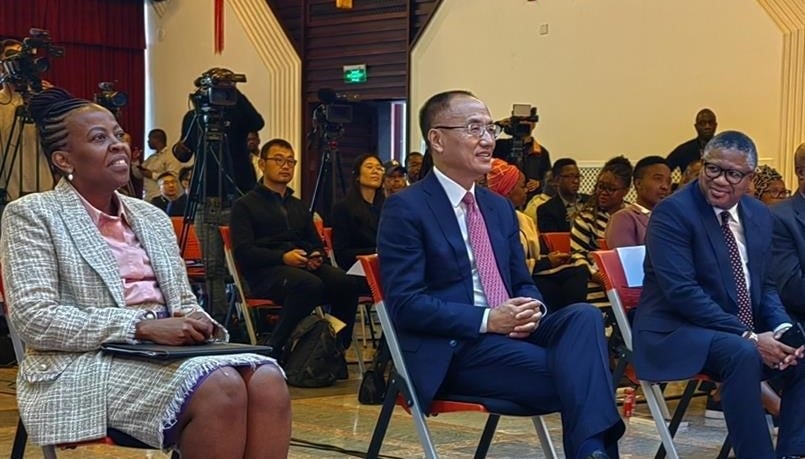
ANC secretary-general Fikile Mbalula, introduced as “comrade” by the Chinese embassy on Friday, said his party supported an end to Western sanctions against Zimbabwe, North Korea, and Cuba.
On Friday, at the Chinese embassy in Tshwane, Mbalula was joined by the ANC’s second deputy secretary-general, Maropene Ramokgopa, who is also a minister in the Presidency, as a show of the governing party’s support ahead of China President Xi Jinping’s state visit with President Cyril Ramaphosa on Tuesday.
The visit comes days before the start of the BRICS summit that is scheduled to run from Tuesday to Thursday at the Sandton Convention Centre in Johannesburg.
Mbalula and Ramokgopa were at the embassy as guests of China Ambassador Chen Xiaodong, who said South Africa and China had “strong mutual respect and trust” on the “political front”.
“We closely communicate and coordinate with each other in international affairs,” Xiaodong added.
Mbalula said the ANC, together with the Chinese Communist Party, was part of the “non-aligned movement; we are also part of the anti-imperialist and anti-colonial forces”.
“Our participation together with the Communist Party of China in BRICS seeks to cement the global aspirations for an alternative world where all countries compete on the basis of their natural and human resource endowment as opposed to unipolar dictatorship,” Mbalula added.
He said:
On Friday, Xiaodong confirmed Jinping and Ramaphosa would host an Africa-China dialogue on the BRICS sidelines.
The Chinese ambassador said Africa would be represented by Senegal President Macky Sall, who is the current chairperson of the Forum on China-Africa Co-operation, as well as Comoros President Azali Assoumani, whose country currently occupies the rotating Africa Union chairperson position.
Mbalula said the party would lobby for more significant investment in the country’s mining industry, adding South Africa did not want to just export raw materials.
“Instead, we want to have our minerals beneficiated here in South Africa as part of our industrialisation drive. That’s another area China could look into, [which] is mineral beneficiation.”
The August 23 general election, Zimbabwe’s 9th since independence in 1980. Here’s a simple guide to the entire process. Source: Zimbabwe election: Your guide to how the electoral system works | Elections News | Al Jazeera Supporters of Zimbabwe’s President Emmerson Mnangagwa cheer at a rally before the 2023 general elections on August 23, at […]
The August 23 general election, Zimbabwe’s 9th since independence in 1980. Here’s a simple guide to the entire process.
Source: Zimbabwe election: Your guide to how the electoral system works | Elections News | Al Jazeera
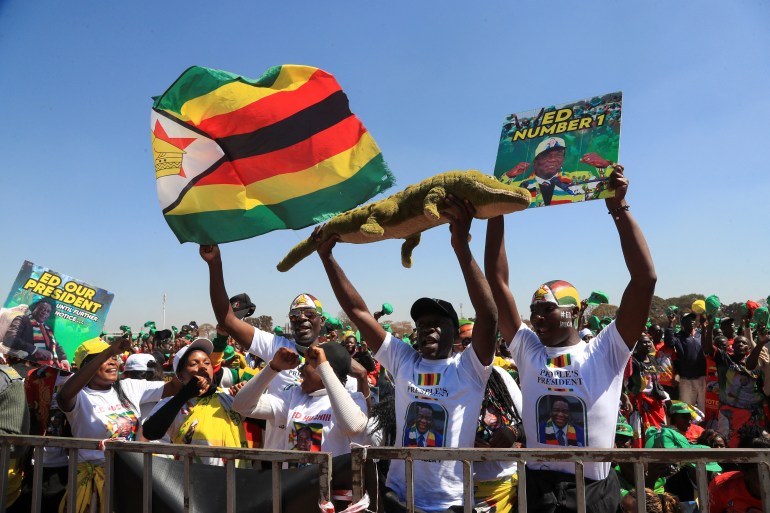
Harare, Zimbabwe – On August 23, Zimbabweans head to the polls to choose the country’s next president in what political pundits believe will be a tight race.
But the race is largely seen as a rematch between Nelson Chamisa, the 45-year-old opposition leader and the man who defeated him in the 2018 presidential election, Emmerson Mnangagwa, the incumbent president.
Mnangagwa, 80, who took over the reins from Robert Mugabe, Zimbabwe’s first president, after a November 2017 coup, is the leader of the Zimbabwe African National Union–Patriotic Front (ZANU-PF).
Chamisa has led the Citizens Coalition for Change (CCC) since it was formed in January 2022 after a split from the Movement for Democratic Change – Alliance, previously the leading opposition party.
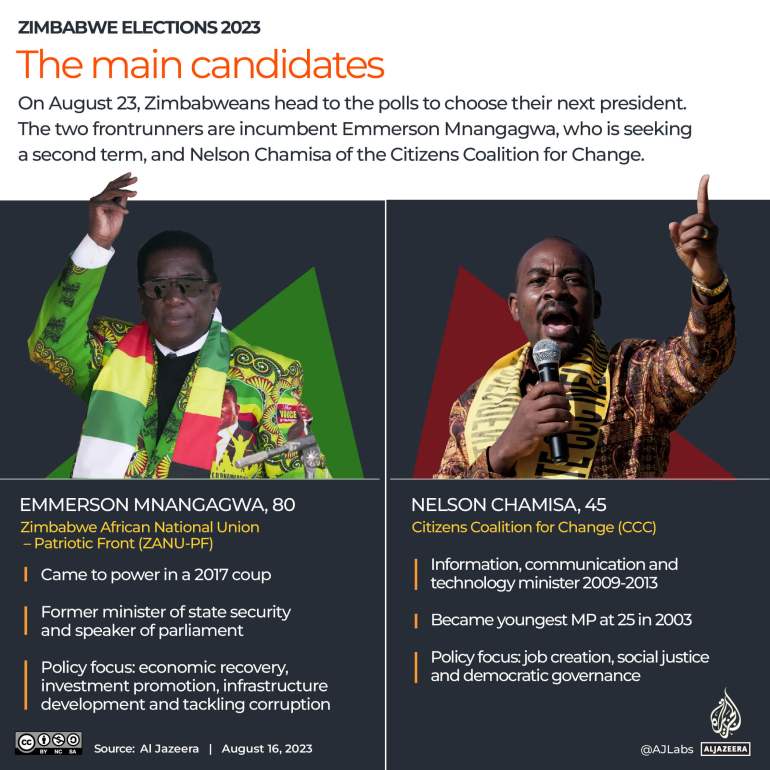
The field also includes activist and constitutional law professor Lovemore Madhuku of the National Constituent Assembly.
Douglas Mwonzora, leader of the Movement for Democratic Change (MDC-T) withdrew his candidacy on August 8 saying the election is a farce, but the electoral commission has said the ballot papers had already been printed.
A total of 6.5 million people have registered to vote across the 12,340 polling stations in the country’s 10 provinces.
This is the ninth election since independence in 1980 for the country of an estimated 15.5 million people.
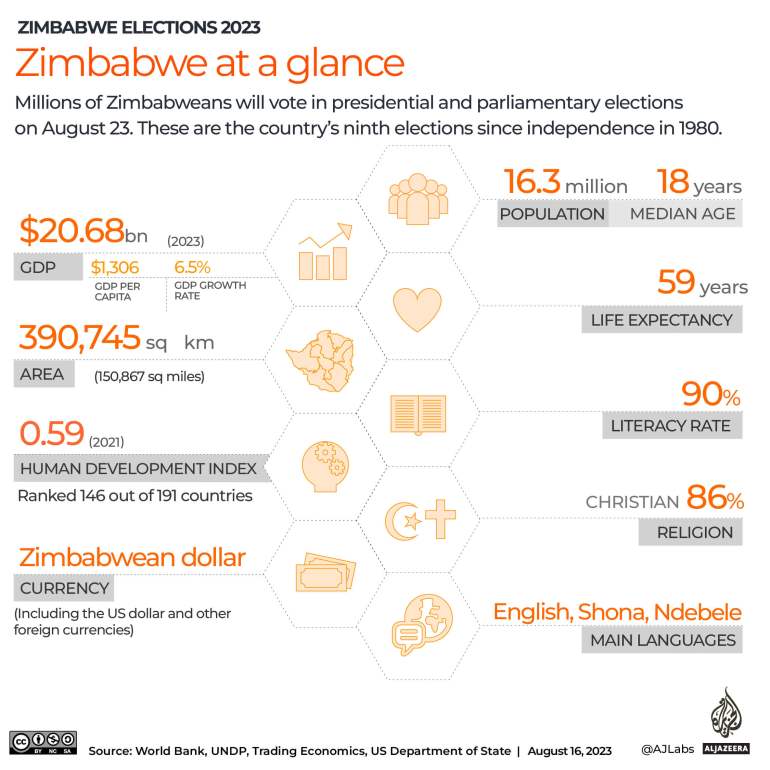
According to the 2013 Constitution, Zimbabwe must hold general elections after every five years. The last election was held in July 2018.
Political parties and independent candidates can participate in the elections. Candidates are required to pay a nomination fee; for 2023, the fee was set at $1,000 for parliamentary candidates and $20,000 for presidential candidates.
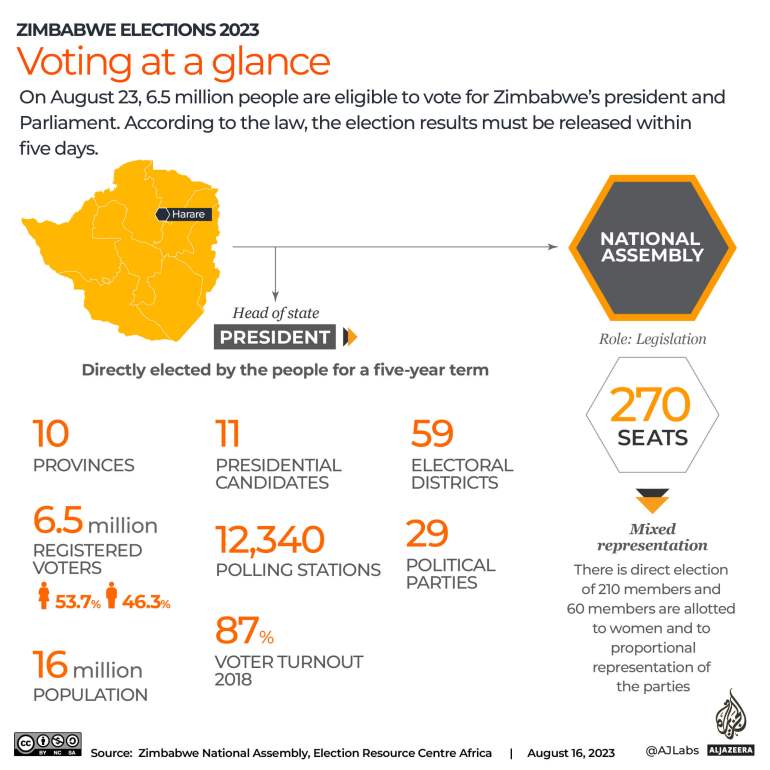
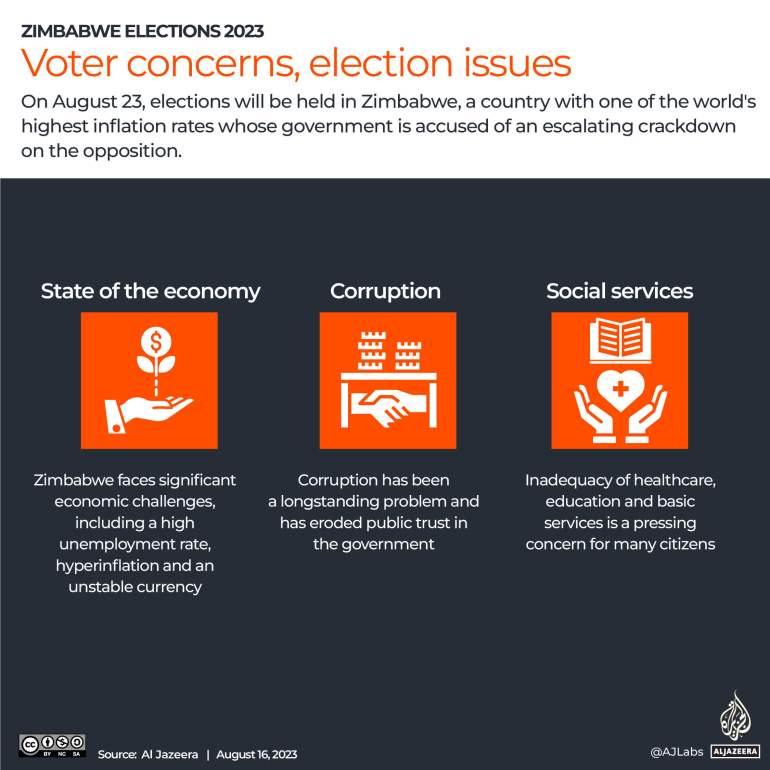
Besides the presidential election, Zimbabweans will also elect local council representatives and members of parliament.
Since the 2013 Constitution, the National Assembly of Zimbabwe, the lower house of Zimbabwe’s parliament, comprises 270 members. Of those, 210 representatives are elected through single-member constituencies.
The remaining 60 seats are specifically designated for women and are allocated using proportional representation across 10 constituencies, each containing six seats. This proportional representation was based on the geographical divisions of the country’s provinces. On the day of the election, each voter casts a single ballot, a decisive factor in the distribution of seats to the respective parties for both categories of seats.
The Senate has 80 members.
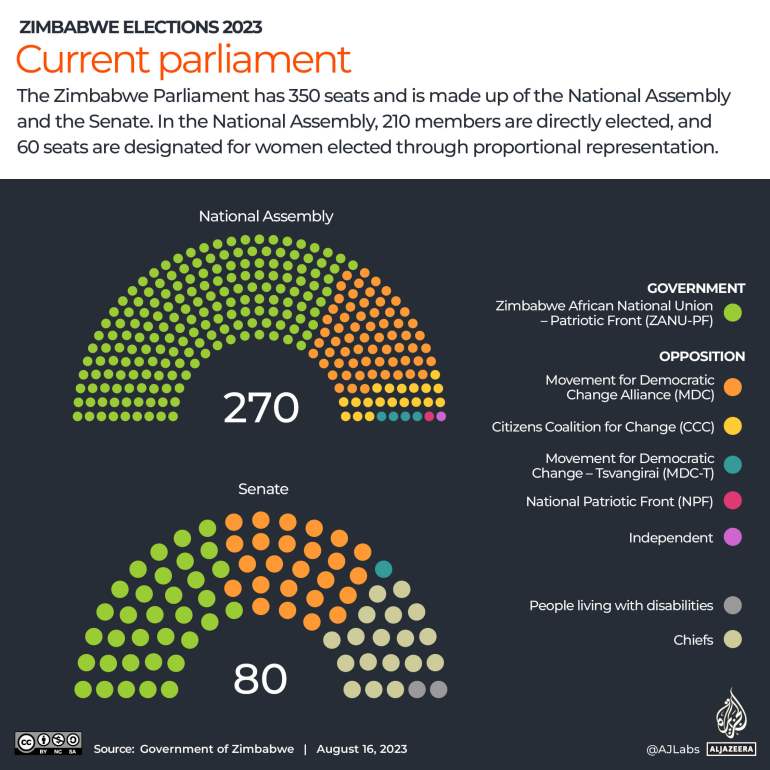
According to Zimbabwe’s Electoral Act, results for any of the elections should be announced within five days from the close of polling.